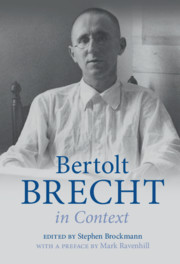Book contents
- Bertolt Brecht in Context
- Bertolt Brecht in Context
- Copyright page
- Contents
- Figure
- Notes on Contributors
- Chronology
- Abbreviations
- Preface
- A Note on Brecht in English
- Introduction
- Part I Brecht’s World
- Part II Brecht’s Work
- Part III The World’s Brecht
- Chapter 23 Brecht and Feminism
- Chapter 24 Brecht in Southern Africa
- Chapter 25 Brecht in the Creation, Production, and Analysis of Opera Today
- Chapter 26 Brecht and His Biographers
- Chapter 27 Brecht Editions
- Chapter 28 Brecht and German Studies
- Chapter 29 Beginning Where Brecht Left Off: Heiner Müller and Brecht’s Legacy
- Chapter 30 Bertolt Brecht in Brazil
- Chapter 31 World Spirit versus Spirit of the Age: Brecht’s Impact and Influence on East German Literature and Culture
- Chapter 32 Brecht in Fiction
- Chapter 33 Brecht and Contemporary Experimental Theater
- Chapter 34 Brecht and US Actor Training
- Chapter 35 Brecht and Transcultural Theater
- Chapter 36 Thinking Brecht in(to) the University
- Chapter 37 “Shrunk in Translation” or: The (Ir)resistible Rise of the Old Traduttore/Traditore Tradition …
- Concise Bibliography
- Index
Chapter 24 - Brecht in Southern Africa
from Part III - The World’s Brecht
Published online by Cambridge University Press: 28 May 2021
- Bertolt Brecht in Context
- Bertolt Brecht in Context
- Copyright page
- Contents
- Figure
- Notes on Contributors
- Chronology
- Abbreviations
- Preface
- A Note on Brecht in English
- Introduction
- Part I Brecht’s World
- Part II Brecht’s Work
- Part III The World’s Brecht
- Chapter 23 Brecht and Feminism
- Chapter 24 Brecht in Southern Africa
- Chapter 25 Brecht in the Creation, Production, and Analysis of Opera Today
- Chapter 26 Brecht and His Biographers
- Chapter 27 Brecht Editions
- Chapter 28 Brecht and German Studies
- Chapter 29 Beginning Where Brecht Left Off: Heiner Müller and Brecht’s Legacy
- Chapter 30 Bertolt Brecht in Brazil
- Chapter 31 World Spirit versus Spirit of the Age: Brecht’s Impact and Influence on East German Literature and Culture
- Chapter 32 Brecht in Fiction
- Chapter 33 Brecht and Contemporary Experimental Theater
- Chapter 34 Brecht and US Actor Training
- Chapter 35 Brecht and Transcultural Theater
- Chapter 36 Thinking Brecht in(to) the University
- Chapter 37 “Shrunk in Translation” or: The (Ir)resistible Rise of the Old Traduttore/Traditore Tradition …
- Concise Bibliography
- Index
Summary
Although Brecht entered the South African repertoire only in the 1950s, 1930s political theater drew communists and other leftists local and expatriate including Kurt Baum who worked with Piscator and thus in the same milieu as Brecht in 1920s Berlin. Despite notoriety as a leftist writer, Brecht featured as a star of European art theater and a sign of high culture on university stages in the1950s and in subsidized theaters in the 1960s striving to represent “Western civilization” against alleged threats from communism or African nationalism. In contrast, the anti-apartheid theater of the 1970s–1990s from Fugard and Serpent Players to Junction Avenue Theatre with Purkey, Makhene and others, and the Market Theatre with Simon and others deployed the Lehrstück, epic theater, and Brechtian pedagogy to challenge the power of state and capital with activists and workers as well as professional performers. Postapartheid theater has borrowed from Boal as well as Brecht to create participatory dramaturgies for tackling crises such as AIDS, gender violence, and corruption in state and local government.
Keywords
- Type
- Chapter
- Information
- Bertolt Brecht in Context , pp. 208 - 216Publisher: Cambridge University PressPrint publication year: 2021

